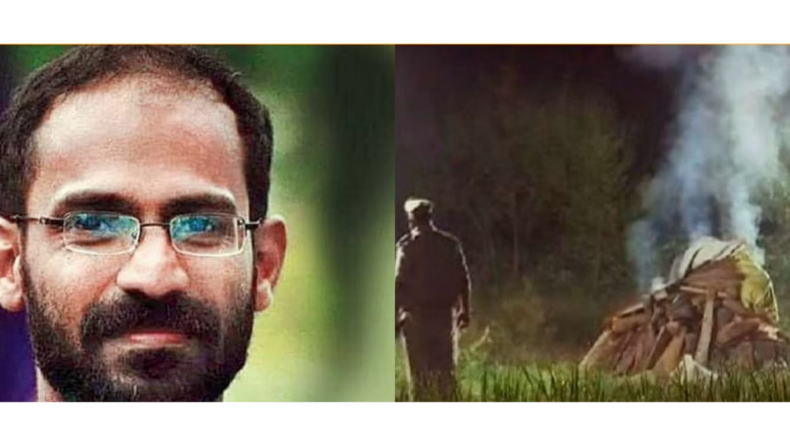The Apex court has bailed out journalist Siddique Kappan referring to the imputation as an egregiously malevolent instance
Background
On 5/Oct/2020, journalist Siddique Kappan was arrested on his way to Uttar Pradesh’s Hathras to report on a 19-year-old Dalit girl’s gang-rape, and he was charged with plotting a divisive campaign in the area.
And to ensure that he was kept in prison for a long time, the police invoked several arraigning provisions of the “Unlawful Activities Prevention Act” (infamously abbreviated as UAPA), uapa uapauapa
- he was alleged for raising funds for a terrorist act and a conspiracy to commit it,
- further inculpated under penal p provisions concerning promoting enmity between communities.
- He was purported as a member of the Popular Front of India.
- Pamphlets calling for justice for the victim and literature in English (which were related to ‘Black Lives Matter’ protests in the United States), were ostensibly linked to him.
Present verdict of the court
On 9/Sep/2022, the top court ruled out the allegations made by the Uttar Pradesh police as baseless and upheld the right to demand justice for the crime.
CJI U.U. Lalit observed that,
“How can a person voicing support for a victim gets into a conspiracy to inflict the society,” and
moreover, “why would a person intending to incite disharmony use pamphlets in English written for a protest in another country.”
The bench proved the shaky foundations of the whole case. And the bail order stands as an illustration depicting how a prudent approach can resolve such false convictions.
UAPA: The inferno silencer

Enacted in 1967 to encounter unlawful activities, which were nudging the focus of the government to focus on imminent border issues with China and Pakistan arising at that time.
This law was invoked on the recommendations of the National Integration Committee – in 1960.
The most unnerving provisions of this act are:-
- Sec 15: defines “terrorism” as: any act with an intent to threaten / likely to threaten the unity, integrity, security, or sovereignty of India, or any act which has an intent to strike terror / likely to strike terror in the people deterring them to cause death or injury, by using explosives, inflammable substance, any other lethal weapons or by any other means.
- Sec 43 D: of the act obligates the burden of proof on the accused, and thus treats the accused as guilty unless proven innocent.
- Sec 43 D Clause (5): of the act denies bail to the accused, based on prima facie charges, without a proper investigation.
It is these stringent provisions of the act that makes it have a stifling effect on the accused. The discrepancy of the phrase used to define terrorism under sec 15 – “by any other means”, gives a wide range of discretion to the authorities to inculpate activists, opposition party members, and journalists who voice against the government.
Similar laws
1) Terrorist and Disruptive Activities Prevention Act (TADA) – 1985:
- Mainly enacted to quell the Khalistan insurgency in the 1980s.
- Due to blatant misuse of the law by the security agencies, it was revoked in 1995.
2) Prevention of Terrorist Activities Act (POTA) – 2002:
- This law was intended to liberalize the provisions of TADA.
- But this was again misused by the security agencies to hegemonize people.
- Hence the law was revoked in 1995.
The indelible bogey
Although the provisions of UAPA had been diluted following successive amendments in 2004, 2008, 2012, and 2019, the provisions which favored the State authorities to circumvent freedom just got more stringent, for example – the 2019 amendment permitted the authorities to declare individuals as terrorists.
Court rulings overriding UAPA
1) Ram Manohar Lohia case – 1966: The Supreme Court narrowed down the process of segregating the offenses and thus reduced misclassifying several offenses as “terrorism.”
2) A.K. Roy case – 1982: The Supreme Court warned against any flimsy use of the act.
3) Kartar Singh case – 1994: The Supreme Court asserted that UAPA is deliberately invoked to hinder the bail, and ruled that “disturbance to the public order cannot be termed as a terrorist act.”
4) Hitendra Vishnu Thakur case – 1994: The Apex court further gave a wide definition of terrorism by terming it as “as an act which uses violence with as objective of physical and mental damage to a person or the society as a whole, with an intention of over awing government or disturbance to the social harmony”,
The court also ruled that “criticizing government cannot be termed as terrorism.”
5) Sanjay Dutt case – 1994: The Supreme Court warned against punishing innocents as guilty.
6) Rajiv Gandhi assassination case – 1999: The Court ruled that “the assassinators of Rajiv Gandhi were not intending to awe the government, hence they cannot be declared as terrorists.”
7) PUCL judgment – 2003: The definition of terrorism got broadened by adding “those acts which are detrimental to the constitutional principles and promote prejudice and bigotry.”
8) Yakub Memon case – 2013: The Supreme Court defined a range of activities such as “airplane hijacking, car bomb implanting, malicious mailing, usage of chemical – biological – nuclear weapons, kidnapping / assassinating” as acts of terrorism.
Way forward
As reported by the Home Ministry (The Hindu Newspaper – 12/Aug/2021) there were only 2.2% of convictions under the UAPA from 2016 – 2019, with the highest being in the state of Uttar Pradesh.

Image Source – The Hindu
Hence there is a strong need to reconsider the law for the betterment of the languishing “freedom of speech” in the nation.
Read More –
1. Journalist S. Kappan is granted bail, journalist would report to Delhi police; supreme court
2. UAPA misused by all govts irrespective of political differences, says activist.













